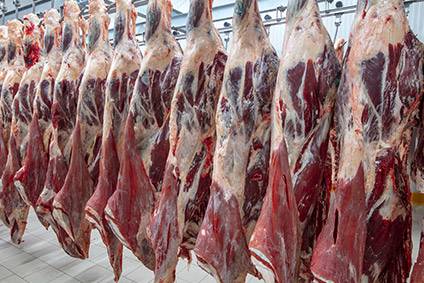
Cranswick and Moy Park are among the UK’s largest meat businesses that have penned a letter to the Government seeking decisive action in relation to post-Brexit trading.
The Government has been trying to thrash out a trade deal with the European Union in last-minute talks ahead of the end to the post-Brexit transition period on 31 December, after which it will go it alone outside of the single market.

Discover B2B Marketing That Performs
Combine business intelligence and editorial excellence to reach engaged professionals across 36 leading media platforms.
But meat industry trade bodies, including the British Meat Processors Association (BMPA), the British Poultry Council and the National Farmers Union (NFU), as well as meat processors such as Cranswick, Pilgrim’s Pride, 2 Sisters Food Group, Moy Park and Dunbia, are warning of a 50-75% drop in export trade to the EU after 1 January if the Government does not address significant barriers to trade immediately.
In a letter addressed to Environment Secretary George Eustice, the meat businesses detail concerns including a shortage of vets in the UK and damage that a new customs certification process will “inflict on exporters”.
They claim that after 1 January, UK firms will be at a “severe competitive disadvantage” due to the new requirement to complete an Export Health Certificate for every single delivery of animal origin products to the EU.
They also draw attention to the fact that, despite being told by the Government to prepare for Brexit, companies cannot begin to implement new systems and IT upgrades until after 18 December when the Standing Committee on Plants, Animals, Food and Feed meets to iron out the details of what exactly British firms will need to comply with.

US Tariffs are shifting - will you react or anticipate?
Don’t let policy changes catch you off guard. Stay proactive with real-time data and expert analysis.
By GlobalDataIn the letter the signatories point out that they represent the largest meat-processing companies in the UK with a combined turnover of GBP8.65bn (US$11.60bn) and employ 46,814 people, while the NFU has 55,000 members/producers.
The letter calls for the government to take more decisive policy action to both increase certification resources and to use its authority to simplify the export process.
“This trade supports hundreds of thousands of jobs across England and Wales. UK to EU food exporters are facing an exponential increase in red tape to comply with EU third-country rules,” it said.
The letter went on: “We do not have unrealistic expectations about the continuation of the status quo. However, we believe that the UK government has to play its part, not just in providing guidance and advice, but to get directly involved in supporting the process by which food achieves the necessary certification to be ready for export to the EU (or any other market).
“We face a resourcing crisis. Government agencies do not have enough vets (certifying officers) to meet the exponential increase in demand that there will be across the food supply chain on 1 January 2021, and therefore, will not provide export health certification (EHCs) for the site and products that they are supervising.”
just-food asked the Department for Environment, Food & Rural Affairs (Defra) for its response.
A Defra spokesperson said: “We are working hard to ensure we have enough vet capacity post transition period, and expect we will have the numbers needed to ensure that the food industry can take advantage of the opportunities and changes that the UK’s new chapter will bring.
“We have doubled the number of official veterinarians qualified to sign EHCs for animal products since 2019, and we are providing funding for surge capacity veterinarians as short term support for the end of the transition period.”





